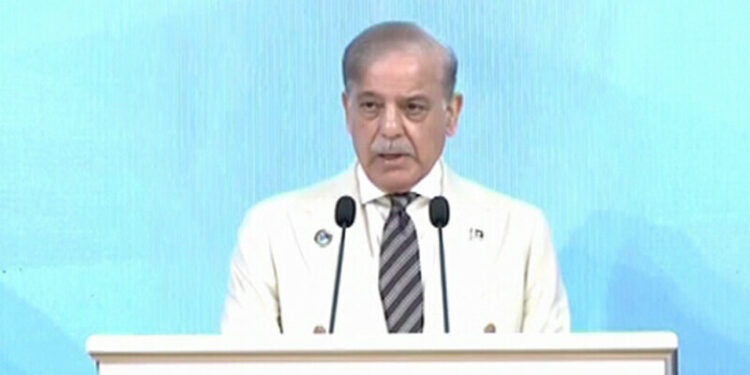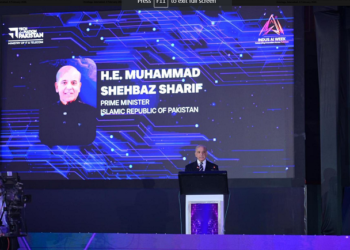Introduction: Pakistan Responds to India’s Unilateral Action on Water Sharing
In a strong and clear message delivered from Dushanbe, the capital of Tajikistan, Pakistani Prime Minister Shahbaz Sharif has termed India’s suspension of the Indus Waters Treaty as “extremely regrettable” and warned that Pakistan will not tolerate any attempts to undermine the region’s water security. Addressing an international conference focused on the protection of glaciers, the Prime Minister highlighted the pressing issue of water being used as a weapon, a growing concern in an already volatile geopolitical landscape.
Historical Background: The Indus Waters Treaty
Signed in 1960 under the auspices of the World Bank, the Indus Waters Treaty (IWT) is one of the most enduring water-sharing agreements in the world. It has survived numerous wars and tensions between India and Pakistan. The treaty allocates the three eastern rivers (Ravi, Beas, and Sutlej) to India and the three western rivers (Indus, Jhelum, and Chenab) to Pakistan, allowing both nations specific rights over water usage. However, recent years have seen increased friction, with Pakistan accusing India of violating the spirit of the treaty by constructing dams and diverting water flows.
India’s Suspension of the Treaty: A Grave Development
India’s decision to suspend its obligations under the Indus Waters Treaty has been viewed by Islamabad as a provocative and hostile action. Prime Minister Shehbaz Sharif, speaking at the glacier protection summit, condemned this move in no uncertain terms. He emphasized that water security is a fundamental human right and cannot be subjected to political gamesmanship. “The lives of millions of people cannot be held hostage for narrow-minded political purposes,” the Prime Minister said, adding, “We will not allow India to cross this red line.”
Water as a Weapon: A Dangerous Precedent
The Prime Minister drew a parallel between the use of conventional weapons in conflict zones like Gaza and the emerging trend of using water as a strategic tool. He warned the global community that such actions pose a new and dangerous threat to regional peace and stability. “We are facing a new worrying decline in the form of the use of water as a weapon,” he said. This perspective is gaining traction among environmental and security experts who fear that control over water resources could become a flashpoint for future conflicts.
The Climate Crisis and Glacial Melt in Pakistan
Beyond the immediate political crisis, Prime Minister Sharif also used the platform to shed light on the broader issue of climate change and its catastrophic impact on Pakistan. With over 13,000 glaciers—more than any other country outside the polar regions—Pakistan is critically dependent on glacial melt for its freshwater supply. “Half of our water comes from glaciers,” he noted, emphasizing the crucial need to protect these natural reserves.
The Prime Minister highlighted that Pakistan has already begun experiencing the devastating effects of climate change. In 2022, the country faced some of the worst floods in its history, displacing millions and causing damage estimated at over $30 billion. “These floods were triggered by unusually heavy monsoon rains and accelerated glacial melting,” he explained. The damage extended to agriculture, housing, and infrastructure, exacerbating the nation’s economic woes.
Pakistan’s Climate Responsibility vs. Climate Vulnerability
Despite being a minimal contributor to global greenhouse gas emissions—less than 0.5% of the global total—Pakistan remains one of the most climate-vulnerable nations. “Pakistan is among the 10 countries most affected by climate change,” said Prime Minister Sharif. This paradox underscores the need for climate justice and international cooperation to support vulnerable nations in adapting to changing environmental conditions.
Global Call for Action
Prime Minister Shehbaz Sharif used the forum to issue a global call for responsible behavior and multilateral dialogue. He urged the international community to intervene diplomatically and ensure that the Indus Waters Treaty remains intact. “It is crucial that international treaties be respected and upheld,” he said, warning that any breach can set a dangerous precedent for other shared water systems around the world.
He also called on developed nations to honor their climate finance commitments to help countries like Pakistan cope with the devastating consequences of global warming. “We need more than promises; we need concrete action,” the Prime Minister said.
The Need for Regional Cooperation
Experts agree that South Asia’s future water security hinges on cooperation rather than conflict. The suspension of the Indus Waters Treaty could derail years of progress and fuel hostility in an already tense region. Water experts, environmentalists, and political analysts have reiterated the importance of dialogue and confidence-building measures.
Pakistan has historically advocated for the resolution of disputes through diplomatic channels, and the Prime Minister’s speech reaffirmed that commitment. However, he made it clear that Pakistan would also defend its rights robustly. “We want peace, but not at the cost of our sovereignty or the well-being of our people,” he concluded.
Conclusion: A Defining Moment for South Asia’s Water Future
The suspension of the Indus Waters Treaty by India marks a critical juncture in South Asian geopolitics. With water scarcity already looming as a major challenge for the region, actions that disrupt established agreements threaten not just bilateral relations but regional peace and stability. Prime Minister Shehbaz Sharif’s powerful address at the Dushanbe conference serves as a reminder that water is not just a resource but a lifeline—and using it as leverage could have catastrophic consequences.
As climate change continues to accelerate glacial melt and alter water patterns, cooperation, not conflict, must be the way forward. The world watches as Pakistan stands firm on this issue, defending its rights while calling for global accountability and environmental stewardship.

























